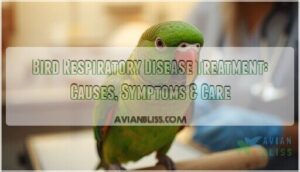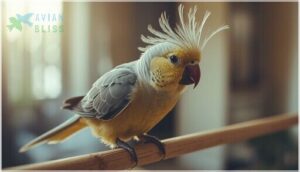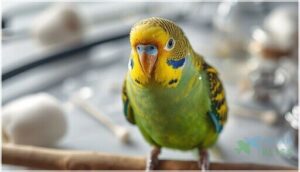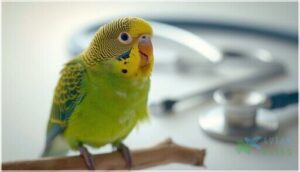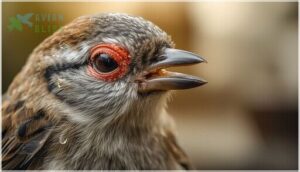This site is supported by our readers. We may earn a commission, at no cost to you, if you purchase through links.
When your bird’s breathing changes—when you notice that subtle tail bob with each breath or hear a faint wheeze—the clock starts ticking. Respiratory disease strikes swiftly in birds, and what seems like a minor snarl can escalate to life-threatening distress within hours.
Their unique respiratory anatomy, with its network of delicate air sacs, makes them both efficient fliers and remarkably vulnerable patients. Understanding bird respiratory disease treatment means recognizing these warning signs early and knowing which conditions require immediate intervention.
From bacterial infections that respond to targeted antibiotics to stubborn fungal diseases that demand months of medication, each respiratory condition follows its own trajectory and requires a specific approach to diagnosis and care.
Table Of Contents
- Key Takeaways
- Causes of Bird Respiratory Disease
- Common Respiratory Diseases in Birds
- Recognizing Respiratory Disease Symptoms
- Species-Specific Risk Factors
- Diagnostic Approach for Respiratory Disease
- Treatment Options for Bacterial Infections
- Treating Fungal and Parasitic Infections
- Supportive Therapies and Hospitalization
- Preventing Respiratory Disease in Birds
- Frequently Asked Questions (FAQs)
- How do you treat respiratory infections in birds?
- How can one cure Bronchiectasis with organics?
- What is the best treatment for a bird with respiratory distress?
- How to prevent respiratory diseases in birds?
- What are the treatment options for bronchitis in birds?
- How do I get rid of breathing problems in birds?
- Can avian respiratory infections be transmitted to humans?
- What is the recovery time for avian respiratory infections?
- Can stress contribute to avian respiratory infections?
- How can I support my bird’s immune system during an infection?
- Conclusion
Key Takeaways
- Bird respiratory disease demands immediate veterinary attention because their unique air sac anatomy causes conditions to escalate from subtle symptoms like tail bobbing to life-threatening distress within hours.
- Accurate diagnosis requires combining physical examination, blood tests, radiography, and sometimes sinus aspirates to distinguish between bacterial infections (treated with antibiotics like doxycycline), fungal diseases (requiring months of antifungal medication), and parasitic infestations (controlled with ivermectin).
- Environmental factors including household aerosols, Teflon toxicity, and vitamin A deficiency from seed-only diets significantly increase respiratory disease risk, making proper husbandry and balanced nutrition essential prevention strategies.
- Severe cases require hospitalization with oxygen supplementation, fluid therapy, and sometimes emergency air sac cannulation, while recovery depends on species-specific treatment protocols and vigilant monitoring for complications.
Causes of Bird Respiratory Disease
Your bird’s respiratory system is vulnerable to threats from multiple sources, and pinpointing the cause is the first step toward effective treatment. Infections, environmental hazards, parasites, and even diet can all trigger breathing problems.
Understanding these four main categories will help you recognize what might be affecting your feathered companion.
Bacterial, Viral, and Fungal Infections
When bacterial infection strikes your bird’s respiratory system, you’re facing organisms like E. coli or Mycoplasma, which account for nearly 20% of cases. Antibiotics treat bacterial prevalence effectively. Viral infections such as avian influenza require supportive care since no approved antivirals exist. Fungal disease, particularly aspergillosis, carries mortality rates up to 23% in some species. Antifungal drugs like voriconazole achieve 70% resolution in fungal cases. Birds of prey and psittacines are at a higher risk for this infection.
Parasitic Infestations
Beyond bacterial and fungal threats, parasitic infections pose unique challenges to your bird’s respiratory health. Air sac mites strike finches and canaries with infection rates reaching 62% in some populations, causing wheezing and sudden death. Gapeworm infection affects pheasants and young turkeys, with mortality hitting 25% during outbreaks. Host susceptibility varies dramatically:
- Gouldian finches are highly vulnerable to air sac mites
- Bengalese finches show natural resistance to respiratory parasites
- Young turkeys face greater gapeworm risks than chickens
- Pigeons carry Trichomonas gallinae at rates up to 56%
- Stress from breeding or molting triggers dormant parasites
Control measures include ivermectin treatment via drinking water and monthly preventive dosing during high-risk periods. These mites are more common during humid weather conditions.
Environmental Irritants and Toxins
Your bird’s home environment can be more dangerous than you realize. Household aerosols, scented candles, and air fresheners irritate delicate respiratory tissues. Teflon toxicity from overheated Teflon-coated appliances causes sudden death. Cigarette smoke exposure increases infection susceptibility by 40%. Metal particulates from paint and industrial emissions compromise immune function.
Air quality matters—HEPA filters remove 99.97% of airborne pollutants that environmental toxins introduce into your bird’s breathing space.
Nutritional Deficiencies
What your bird eats shapes its ability to fight infection. Seed diets lack vitamin A, triggering hypovitaminosis A—squamous metaplasia blocks airways and weakens immune response. Calcium deficiency warps chest bones, restricting breathing. Poor husbandry practices turn nutrition into a silent killer.
- A malnourished bird can’t mount defenses when pathogens strike
- Vitamin A deficiency destroys the protective lining of your bird’s respiratory tract
- Seed-only diets slowly suffocate immune function over months
Common Respiratory Diseases in Birds
Birds can develop several respiratory conditions, each with distinct causes and implications for their health. Understanding the most common diseases helps you recognize what your bird might be facing and why prompt veterinary care matters.
Let’s look at the respiratory infections and conditions that veterinarians diagnose most frequently in pet birds.
Psittacosis (Parrot Fever)
Psittacosis, also known as parrot fever, poses a significant threat to your bird’s respiratory health. This bacterial disease, caused by Chlamydia psittaci, spreads through infected droppings and respiratory secretions.
Psittacosis transmission occurs easily in overcrowded conditions, making prevention methods like daily cage cleaning essential.
Your bird may show avian symptoms including lethargy, nasal discharge, and breathing difficulty. Diagnostic testing using PCR accurately identifies the infection, while treatment duration generally spans 45 days with doxycycline to guarantee complete recovery.
Aspergillosis in Birds
Fungal infection from Aspergillus strikes captive birds hard, with aspergillosis prevalence reaching 24% in some falcon populations. Clinical signs like weight loss, labored breathing, and voice changes appear when spores colonize a bird’s respiratory tract.
Diagnosis requires imaging and sometimes endoscopy, while treatment demands prolonged antifungal therapy—usually itraconazole or amphotericin B—combined with addressing underlying risk factors like poor ventilation or stress.
Avian Influenza and Newcastle Disease
Two viral giants threaten flocks worldwide, with highly pathogenic avian influenza causing 75-100% mortality in chickens and turkeys, while Newcastle disease shows a 2.17% overall prevalence but devastates unvaccinated populations.
- HPAI vaccines achieve 78-97% efficacy against mortality depending on strain match
- RT-PCR is the preferred diagnostic method for avian influenza detection
- NDV prevalence decreased from 3.19% pre-2013 to 1.03% post-2013
- Biosecurity measures and stamping out infected flocks remain primary control measures
- Vaccination programs usually include doses at 7 days, 10-12 weeks, and every 6 months
No specific antiviral treatment exists for HPAI in birds; swift culling stops outbreaks while vaccines offer your best prevention strategy.
Air Sac Mite Infections
When tiny parasites invade your finch’s trachea and air sacs, you’re facing air sac mite infections—a common threat in Gouldian finches and canaries.
Parasitic infections in birds cause wheezing, clicking sounds, and voice loss as mites crowd the airways. Ivermectin remains your go-to treatment, with repeated flock treatment essential since mite transmission occurs through direct contact.
Preventative quarantine of new birds for 30 days blocks introduction into healthy flocks.
Recognizing Respiratory Disease Symptoms
Catching respiratory disease early in your bird can make all the difference in treatment outcomes. Your bird’s body will show you warning signs when something isn’t right with its breathing.
Let’s look at the key symptoms you should watch for so you can act quickly when your feathered companion needs help.
Difficulty Breathing and Tail Bobbing
When your bird struggles for air, each breath becomes a whole-body effort—that rhythmic up-and-down movement of the tail is called tail bobbing, and it’s one of the most urgent respiratory symptoms you’ll see. This clinical sign means your bird’s respiratory system is already severely compromised, and immediate veterinary attention is critical.
Key emergency signs requiring an oxygen cage include:
- Tail bobbing at rest – marked rhythmic tail movement with every breath indicates late-stage dyspnea
- Open-mouth breathing – a late-stage sign of respiratory distress stages progressing rapidly
- Wing flaring or extended neck – your bird is working harder to pull air through obstructed airways
- Inability to perch – extreme weakness suggests life-threatening dyspnoea requiring emergency interventions
- Blue-tinged membranes – cyanosis signals critical oxygen deprivation and poor prognosis factors
These avian emergency signs don’t appear until the disease is well along. Tail bobbing causes range from airsacculitis and aspergillosis to air sac mite infestations—all share the common thread of restricted airflow. If you notice these clinical signs, don’t wait; your bird needs professional care now, before respiratory collapse occurs.
By the time you see tail bobbing, your bird’s respiratory disease is already advanced—don’t wait for collapse
Nasal Discharge and Sneezing
When you notice your bird with a runny nose or frequent sneezing, you’re likely seeing rhinitis or sinusitis at work. Bacterial infections account for 40–60% of rhinorrhea cases, while fungal causes contribute 20–30%.
Diagnostic accuracy improves with sinus aspiration or sinus flush procedures, which identify specific pathogens. Infection prevalence, species variation, and treatment efficacy all shape your bird’s recovery timeline, and prevention methods—like proper diet and cage hygiene—reduce recurrence risk.
Voice Changes and Open-Mouth Breathing
When your bird develops a raspy, weak, or hoarse voice, you’re observing tracheal infection or syringeal denervation affecting sound frequency. Open-mouth breathing signals airflow restriction from pus or mucus—watch for cyanosis indicator like purple-tinged skin.
These clinical signs differ from rhinorrhea; auscultation reveals upper airways obstruction with prognostic value. Dyspnoea alongside voice changes means severe respiratory compromise requiring immediate veterinary attention.
Eye Discharge and Wheezing
When you spot watery eyes paired with wheezing, you’re seeing systemic involvement that links the ocular-respiratory connection across multiple body systems. Pathogens like Mycoplasma and Chlamydia produce this dual presentation, offering diagnostic significance for your veterinarian.
Look for these concurrent infection patterns:
- Crusty eyelid discharge alongside audible breathing sounds
- Conjunctivitis with tracheal rales indicating lower airway compromise
- Mucopurulent ocular drainage plus dyspnea as prognostic indicators
- Combined sinus swelling and respiratory distress requiring emergency stabilization
These clinical signs demand immediate attention—mortality can reach 50% in untreated chlamydiosis cases showing both eye discharge and respiratory disease progression.
Species-Specific Risk Factors
Not all birds face the same respiratory challenges. Some species carry hidden vulnerabilities in their anatomy, while others develop problems tied to common dietary habits or environmental exposures.
Understanding your bird’s specific risk factors can help you catch early warning signs and prevent serious illness down the road.
Susceptibility in Budgerigars and Cockatiels
Although budgerigars and cockatiels can harbor Chlamydia psittaci or Mycoplasma without showing signs, recent surveys confirm psittacosis prevalence in these pet birds reaches 0.97% overall, with 80% of positives found in commercial settings.
Poor husbandry impacts—damp seeds, crowding, inadequate ventilation—worsen zoonotic risks and trigger hypersensitivity pneumonitis in keepers.
Environmental factors like feather dust compound respiratory disease vulnerability, making early clinical presentation subtle yet critical for treatment of respiratory disease.
Respiratory Issues in Amazon Parrots
Older Amazon parrots fed all-seed diets often develop vitamin A deficiency, which weakens the respiratory lining and opens the door to opportunistic infections like bacterial sinusitis and aspergillosis. Fungal granulomas can block airways, causing voice changes or sudden distress.
Veterinarians use PCR testing to confirm Chlamydia psittaci and may prescribe prophylactic azoles in high-risk settings, making early treatment of respiratory disease essential for your pet birds’ avian health.
Air Sac Mites in Finches and Canaries
Unlike many respiratory diseases, air sac mites spread when adult finches and canaries feed their chicks, transferring Sternostoma tracheacolum from parent to nestling.
You’ll see affected birds lose their voice, wheeze, or tail-bob as parasitic infections damage the trachea and air sacs.
Ivermectin or moxidectin, given twice, two weeks apart, breaks the mite life cycle and prevents airsacculitis in your flock.
Diagnostic Approach for Respiratory Disease
When your bird shows signs of respiratory trouble, getting an accurate diagnosis is the first step toward recovery. Understanding these diagnostic tools can help you know what to expect during your bird’s veterinary visit. Your veterinarian will use a combination of physical examination techniques, laboratory tests, and imaging to pinpoint what’s causing the problem.
Clinical Examination Techniques
Your vet begins with distant observation, watching your bird’s breathing pattern before any handling—tail bobbing or open-mouth breathing signals serious trouble.
The clinical examination progresses systematically: checking the nares for discharge, auscultation over the chest to detect abnormal sounds, and sinus palpation to identify swelling.
If needed, endoscopic access allows direct visualization of the trachea and air sacs, pinpointing disease locations precisely.
Blood Tests and Imaging (Radiographs)
Blood tests reveal systemic involvement, with leukocytosis appearing in 60–80% of birds showing respiratory signs. CBC changes further indicate the severity of infection.
Radiography plays a crucial role in uncovering conditions like pneumonia, air sacculitis, or nodular lesions that physical examination alone cannot detect.
When veterinarians combine these diagnostic tools, the workup for birds becomes far more accurate. This approach enables early detection of aspergillosis and guides targeted treatment before complications arise.
Sinus Aspirate and Culture Procedures
When upper respiratory signs persist, a sinus aspirate or sinus flush becomes essential in the diagnostic approach for respiratory disease. This aspiration technique targets your bird’s infraorbital sinus to collect material for diagnostic testing and culture, greatly improving diagnostic yield.
The procedure involves four key steps:
- Needle placement using a 22- to 25-gauge needle in the sinus compartment
- Sample collection with gentle aspiration of exudate or flush fluid
- Sample handling through immediate sterile transfer to prevent contamination
- Pathogen detection via bacterial, fungal, and mycoplasma culture with sensitivity testing
While generally safe, potential complications include minor bleeding or mucosal irritation, so your veterinarian monitors your bird closely throughout the diagnosis of respiratory disease.
Identifying Underlying Causes
Why do some birds recover quickly while others struggle? Pinpointing the infection source, environmental factors in birds, and nutritional status makes all the difference.
Your veterinarian evaluates diagnostic testing results alongside diet history, housing conditions, and parasitic contributors. Diagnostic delays worsen outcomes, so early identification of causes of respiratory disease—whether infectious, environmental factors, or nutritional deficiencies—guides targeted treatment and prevents complications.
Treatment Options for Bacterial Infections
When your bird is diagnosed with a bacterial respiratory infection, your veterinarian will prescribe antibiotics specifically chosen to target the bacteria causing the illness.
The treatment plan doesn’t stop there—your bird will also need supportive care at home to help its body heal and regain strength.
Throughout recovery, you’ll need to watch for specific warning signs that could indicate complications or the need for adjustments to the treatment approach.
Antibiotic Selection and Administration
Choosing the right antibiotics for your bird’s respiratory disease starts with identifying the pathogen. Empirical selection targets common culprits—gram-negative bacteria and Chlamydia in parrots—but MIC testing guides precise antibiotic therapy.
Administration routes matter: parenteral injections deliver faster results than medicated water in severe bacterial infections.
Proper dosing strategies prevent resistance control issues, so you’ll want to complete the full course your vet prescribes.
Supportive Care During Recovery
Once antibiotics start working, your bird’s recovery depends on thorough supportive care that covers every physical need. You’ll see better outcomes when you combine medical treatment with these essentials:
- Thermal Support: Keep hospitalized birds at 29–32°C to reduce energy spent on staying warm
- Oxygen Therapy: Provide oxygen-enriched environments when breathing remains labored
- Fluid Therapy and Nutritional Support: Deliver IV fluids and gavage feeding to dehydrated, weak patients
Nebulisation helps clear airways, while vitamin A supplementation strengthens respiratory defenses during healing.
Monitoring for Complications
Even with the right antibiotics, you can’t assume recovery is on track. Watch for dyspnea, open-mouth breathing, and yellow-green urates—signs of organ dysfunction.
Schedule imaging follow-up after two weeks of treatment to check progress. If your bird shows weakness, ascites, or deteriorating lab values despite supportive care, notify your veterinarian immediately.
Early detection of complications keeps treatment options open.
Treating Fungal and Parasitic Infections
When bacteria aren’t the culprit behind your bird’s respiratory distress, fungal or parasitic infections may be to blame. These conditions require different medications and treatment approaches than bacterial diseases, so accurate diagnosis becomes essential.
Let’s look at the specific therapies your veterinarian might recommend for these types of infections.
Antifungal Medications for Aspergillosis
When your bird battles aspergillosis, oral antifungal drugs like itraconazole become the backbone of treatment, generally given at 5–10 mg/kg once or twice daily for several months. Azole therapies work well, but chronic fungal infections in birds often need prolonged care—sometimes a year or more.
For severe cases, amphotericin B or inhaled azoles deliver stronger action, while terbinafine use combined with other medications addresses resistant strains effectively.
Anti-Parasitic Drugs for Air Sac Mites
After tackling fungal culprits, air sac mites in finches and canaries need macrocyclic lactones such as ivermectin. You’ll generally apply 0.2–0.4 mg/kg orally or topically, repeating after 7–14 days to catch newly hatched parasites. Moxidectin offers a solid alternative at 0.2 mg/kg.
- Topical application as one drop on skin suits small birds under 50 g
- Flock treatment prevents reinfection from untreated cage mates
- Resistance concerns arise with overuse, so confirm parasitic infections first
Nebulization Therapy Benefits
When respiratory disease confines your bird to shallow breaths, nebulisation delivers medication directly to infected airways with targeted delivery and toxicity reduction.
You’ll find nebulisation techniques helpful for mucociliary clearance, loosening thick secretions that trap pathogens.
As adjunctive therapy alongside systemic drugs, nebulisation in birds offers practical advantages—especially for upper respiratory infections—by saturating diseased tissues while sparing kidneys from excess medication exposure.
Supportive Therapies and Hospitalization
When your bird’s respiratory disease becomes severe, hospitalization may be the safest path forward.
In these critical situations, your veterinarian will use a combination of supportive therapies designed to stabilize your bird and give treatments the best chance to work. These interventions address the immediate life-threatening aspects of respiratory distress while the underlying infection or condition is being treated.
Oxygen Supplementation
When your bird struggles to breathe, oxygen becomes their lifeline—but delivery matters as much as the decision to use it. For birds with severe respiratory disease, oxygen supplementation is often the first critical step in treatment, stabilizing your pet before diagnostics can safely proceed.
Key oxygen therapy considerations include:
- Delivery methods – Oxygen chambers or incubators work best, delivering 40–50% inspired oxygen at 1–2 L/min for small birds
- Flow rates – Adjust based on your bird’s size and distress level, with larger birds needing proportionally higher flow
- Monitoring SpO2 – Aim to keep oxygen saturation above 90% while using the lowest effective concentration
- Oxygen toxicity – Prolonged high-concentration exposure can injure the avian respiratory system, so veterinarians limit extended therapy
- Humidification needs – Sessions longer than one hour require humidified oxygen to prevent airway drying and support nebulization treatments
Fluid and Nutritional Support
Beyond oxygen, your bird’s recovery hinges on hydration and nutrition—two pillars that work together to rebuild strength. Fluid therapy protocols in avian medicine generally start at 50–100 ml/kg per day, adjusted for your bird’s dehydration level. Sick birds often arrive 5–10% dehydrated, requiring calculated fluid deficits replaced over 48 hours alongside maintenance needs.
| Therapy Component | Clinical Protocol | Key Considerations |
|---|---|---|
| Fluid Therapy | 50–100 ml/kg/24 hours maintenance; add 5–10% deficit replacement | Use isotonic crystalloids; IV/IO routes for severe cases |
| Nutritional Protocols | Start gavage after rehydration; 1–1.5% body weight initial volumes | Elemental diets reduce metabolic stress; increase to 2–3% as tolerated |
| Vitamin Supplementation | Thiamine 1–2 mg/kg SQ daily during refeeding; correct vitamin A deficiency | Hypovitaminosis A increases infection risk; supportive B-complex aids recovery |
Nutritional protocols begin only after adequate hydration, preventing circulatory collapse during assisted feeding. For severely ill birds, veterinarians use critical-care diets formulated around 3,200 kcal/kg, delivered at conservative enteral volumes—never exceeding 5% body weight per feeding to avoid aspiration.
Your bird’s diet history matters: seed-only diets often cause vitamin A deficiency, weakening respiratory defenses and complicating recovery. Refeeding syndrome poses a real danger in emaciated patients, so gradual calorie reintroduction paired with B-complex vitamin supplementation protects against metabolic crashes.
Avian medicine emphasizes patient-specific adjustments—what works for a budgerigar differs from protocols for an Amazon parrot, requiring veterinary expertise to balance fluid and nutritional support safely.
Air Sac Cannulation and Emergency Stabilization
When your bird’s upper airway is blocked and every breath becomes a struggle, air sac cannulation provides a lifesaving bypass route for oxygen and anesthesia. The cannula placement technique involves a small incision over the last ribs, directing the tube into the caudal thoracic air sac—effectively sidestepping obstructions at the glottis or trachea that make endotracheal tube insertion impossible.
Critical stabilization steps include:
- Pre-procedure oxygen enrichment — Place your bird in a warmed incubator at 85–90°F with 35–50% oxygen before attempting cannulation, reducing hypoxemia and stress-related collapse.
- Daily patency checks — Loss of cannula function occurred in nearly 24% of cases, making multiple daily assessments essential to prevent respiratory failure.
- Antibiotic coverage — Peri-interventional antimicrobials notably improved survival rates, protecting against infectious post-op complications during recovery.
Prognostic indicators matter: voice changes at presentation and exercise intolerance signal higher complication risks, while intercostal placement sites showed better outcomes.
Air sac cannulation isn’t just for dyspnea emergencies—it permits prolonged anesthesia during head and neck surgeries where traditional airways interfere. Nebulization and oxygen supplementation through the cannula maintain ventilation while your veterinarian treats underlying causes like air sacculitis or tracheal obstruction, giving critically ill birds a fighting chance.
Preventing Respiratory Disease in Birds
Prevention is always better than treatment for respiratory disease in birds. By focusing on a few key areas, you can greatly reduce your bird’s risk of developing respiratory problems.
The following strategies will help you create a healthier environment and strengthen your bird’s natural defenses.
Environmental Hygiene and Biosecurity
Think of your bird’s environment as the first line of defense against respiratory illness. Housing sanitation and biosecurity practices work together to block disease before it starts.
Clean cages daily, disinfect perches weekly, and maintain proper ventilation quality to reduce airborne dust and pathogens.
Quarantine measures for new birds protect your flock, lowering zoonotic risk while supporting long-term disease prevention through consistent preventative measures and thoughtful waste management.
Balanced Diet and Vitamin Supplementation
What you feed your bird directly shapes its immune function and respiratory health. Vitamin A deficiency remains the top nutritional cause of upper airway disease in seed-eating birds, making pelleted diets your best defense against hypovitaminosis A.
Shift slowly to quality formulated rations that provide 5,000–8,000 IU vitamin A per kilogram. Avoid over-supplementation risks—excess vitamins harm as much as deficiency does.
Regular Veterinary Check-Ups and Vaccination
Even a well-balanced diet won’t replace the clinical eye of an avian veterinarian. Wellness exams catch respiratory disease before you notice tail bobbing or nasal discharge—early detection changes everything.
Schedule annual check-ups for healthy birds and twice yearly for senior parrots:
- Core vaccination protocols protect against polyomavirus starting at 35 days
- Blood tests and imaging reveal subclinical infections
- Preventative care improves long-term outcomes despite low compliance rates
Your veterinarian designs species-specific vaccination protocols and monitors respiratory health proactively.
Frequently Asked Questions (FAQs)
How do you treat respiratory infections in birds?
When your bird struggles to breathe, don’t put all your eggs in one basket—treatment of respiratory diseases requires antibiotics like doxycycline or enrofloxacin, antifungal therapies, nebulisation benefits, fluid therapy, and often inpatient support for recovery.
How can one cure Bronchiectasis with organics?
No clinical evidence validates organic products curing bronchiectasis in birds. Traditional medicine has its limits.
Nutritional support and antioxidant benefits may aid respiratory disease management alongside conventional care, but airway clearance and veterinary treatment remain essential.
What is the best treatment for a bird with respiratory distress?
Your bird’s respiratory distress needs immediate oxygen therapy, fluid administration, and veterinary care. Nebulization benefits recovery, while certain drugs have contraindications.
Prognosis factors depend on early intervention and addressing underlying causes promptly.
How to prevent respiratory diseases in birds?
Like locking the barn door before the horse bolts, biosecurity protocols and nutritional support form your first defense.
Vaccination strategies, quarantine procedures, and veterinary oversight strengthen your bird’s immune system, making preventative measures essential for respiratory health.
What are the treatment options for bronchitis in birds?
Treatment combines antimicrobial therapy—often doxycycline, enrofloxacin, or tylosin—with supportive husbandry modifications like warmer housing and nebulization therapy.
Vaccination strategies and biosecurity measures prevent future outbreaks, while oxygen and fluid support aid recovery in severe cases.
How do I get rid of breathing problems in birds?
Your feathered friend’s labored breathing won’t magically disappear without professional help. You’ll need veterinary intervention for proper medication options like doxycycline or enrofloxacin, supportive care including nebulisation techniques, and preventative measures alongside any home treatment.
Can avian respiratory infections be transmitted to humans?
Yes, certain avian respiratory infections pose zoonotic disease risks. Psittacosis transmission occurs through inhaling contaminated dust, while avian influenza and fungal infections primarily affect those with occupational exposure to infected birds.
What is the recovery time for avian respiratory infections?
Recovery time ranges from days to months depending on disease severity impact, treatment protocol influence, and host species factors. Mild respiratory infections improve in 3–5 days, while chronic conditions like aspergillosis require weeks of therapy with potential relapse.
Can stress contribute to avian respiratory infections?
Stress immunosuppression weakens your bird’s immune function through elevated corticosterone levels, making respiratory disease more likely.
Husbandry stressors, transport impact, and environmental challenges all reduce vaccine efficacy while increasing secondary infections from common avian diseases and pathogens.
How can I support my bird’s immune system during an infection?
You can’t put all your eggs in one basket when supporting your bird’s immune function during infection.
Focus on Vitamin A therapy and omega-3s in your bird diet, reduce stress, assure mucosal immunity through proper nutrition, and provide social support.
Conclusion
The smallest wheeze can signal the greatest threat, yet catching it early transforms crisis into manageable care. Those air sacs that make flight possible also make swift intervention critical. When you notice changes in breathing, you’re not overreacting; you’re recognizing what their anatomy demands: immediate, informed action.
Your vigilance with bird respiratory disease treatment—watching for tail bobbing, scheduling prompt veterinary visits, maintaining clean environments—determines whether your feathered companion thrives or struggles.
- https://www.stjude.org/media-resources/news-releases/2025-medicine-science-news/current-antivirals-likely-less-effective-against-severe-infection-caused-by-bird-flu-in-cows-milk.html
- https://www.nature.com/articles/cddis2013367
- https://www.csis.org/analysis/how-bird-flu-impacting-agriculture-and-food-security-united-states
- https://pmc.ncbi.nlm.nih.gov/articles/PMC8944443/
- https://pubmed.ncbi.nlm.nih.gov/1379426/

